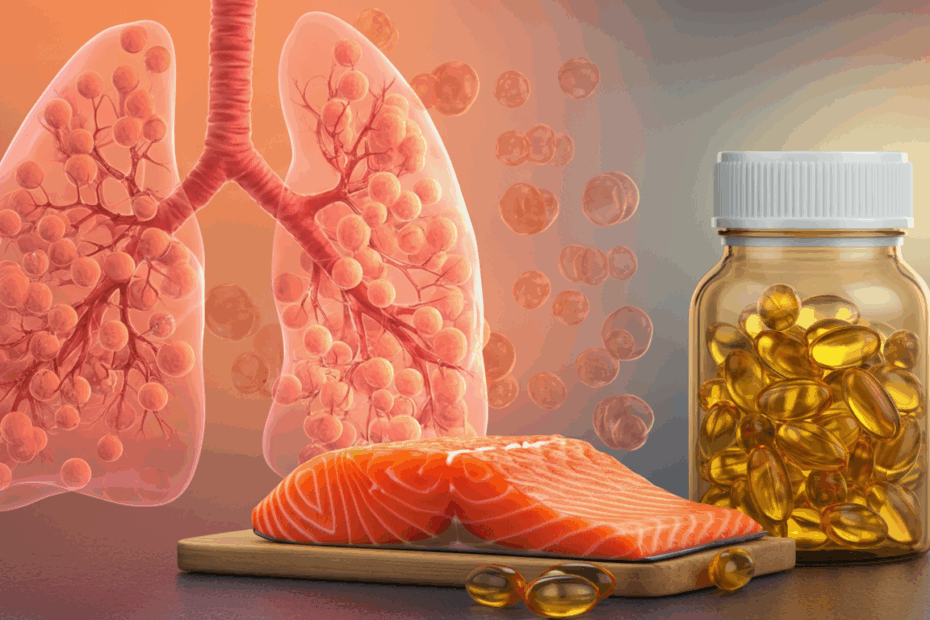A Surprising New Friend for Your Lungs
Hi everyone, John here. When we chat about staying healthy, we often hear about nutrients that are good for our heart or our brain. But what if I told you that one of these famous “good fats” has a newly discovered benefit for something we use every single second? Our lungs!
That’s right. Exciting new research suggests that a nutrient famous for keeping our hearts ticking along nicely also plays a big role in helping us breathe easier for years to come. Let’s dive into this fascinating discovery together.
The Big Health Study: A Closer Look
Imagine scientists deciding to keep a very detailed health diary for over 15,000 people. That’s essentially what happened here. Researchers looked at a huge group of healthy adults from the United States in a major study supported by the National Institutes of Health (NIH). They wanted to see if there was a connection between what’s in our blood and how healthy our lungs are.
They measured the levels of omega-3 fatty acids in the participants’ blood and then tracked their lung function over an average of seven years, and in some cases, up to 20 years. This long-term view is what makes the findings so powerful.
So, What Did They Find? A Breath of Fresh Air!
The results were quite clear and very exciting. People who had higher levels of omega-3 fatty acids in their blood had healthier lungs. Specifically, their lungs showed a slower decline in function over time.
Now, it’s a natural part of aging for our lung capacity to slowly decrease after we hit our 30s. Think of it like a tire that very slowly loses air over many years. What this study found is that omega-3s seem to help slow down that leak, keeping your lungs working more efficiently for longer.
One particular type of omega-3 stood out in the research: DHA.
Lila: “John, hold on a second. The article mentions ‘DHA’ and ‘omega-3 fatty acids.’ That sounds a bit technical. Could you break that down for us?”
John: “Absolutely, Lila! Great question. Think of ‘omega-3 fatty acids’ as a team of superstar nutrients. They’re a type of healthy fat that our body needs but can’t make on its own. Now, on this team, there are a few key players. One of the most valuable players is named DHA (short for docosahexaenoic acid). DHA is especially famous for its role in brain health, but this new study shows it’s a star player for our lungs, too!”
How Do Omega-3s Protect Our Lungs?
So, how does this actually work? The secret seems to lie in fighting inflammation. Our lungs are on the front lines every day, breathing in not just air, but also dust, pollutants, and other irritants. This can cause a low level of constant irritation or swelling inside our lungs, known as inflammation.
Imagine a tiny, smoldering fire that never quite goes out. Over many years, this can damage the delicate tissues of our lungs. This is where omega-3s come in. They have powerful anti-inflammatory properties.
Lila: “Okay, ‘anti-inflammatory’ is a word I see on health blogs all the time. What does it actually mean in simple terms?”
John: “That’s a perfect point, Lila. Let’s use an analogy. If you sprain your ankle, it gets swollen, red, and painful. That’s acute inflammation, your body’s emergency response. ‘Anti-inflammatory’ is like the ice pack you put on it to calm everything down. In our bodies, omega-3s act like a full-time, internal ice pack. They travel around and help soothe that low-level, chronic inflammation in places like our lungs, protecting them from long-term damage. They are also powerful antioxidants, which means they act like bodyguards for our cells, shielding them from damage.”
Ready to Help Your Lungs? How to Boost Your Omega-3 Intake
This is the best part—helping your lungs might be as simple as changing up your grocery list. The most effective way to get more of that lung-protective DHA is through your diet. Here are the top sources:
- Fatty Fish: This is the number one source. Fish like salmon, mackerel, herring, sardines, and albacore tuna are packed with DHA. Eating a serving or two of these fish per week is a fantastic goal.
- Plant-Based Sources: You can also find omega-3s in plant foods like walnuts, chia seeds, and flaxseeds. However, these contain a different type of omega-3 called ALA. Our bodies have to convert ALA into DHA, and it’s not a very efficient process. So, while these are still healthy, fatty fish is the most direct route to getting the lung-boosting DHA.
- Supplements: For those who don’t eat fish, high-quality fish oil or algae-based omega-3 supplements can be a good option. As always, it’s a great idea to chat with your doctor before starting any new supplement to make sure it’s right for you.
A Few Final Thoughts
John’s Take: “For me, this research is a beautiful reminder of how everything in our body is connected. A nutrient we praised for heart health is now showing incredible benefits for our breathing. It really drives home the point that a simple, whole-food diet is one of the most powerful tools we have for our long-term wellness.”
Lila’s Take: “As someone new to all this, I find this really encouraging! It’s not about some complicated scientific formula, but about making small, smart choices. The idea that eating some delicious salmon for dinner could be helping my lungs stay strong for the future makes healthy living feel much more accessible and less intimidating.”
This article is based on the following original source, summarized from the author’s perspective:
Why Getting More Of This Heart-Healthy Nutrient Also Helps
You Breathe Easier
